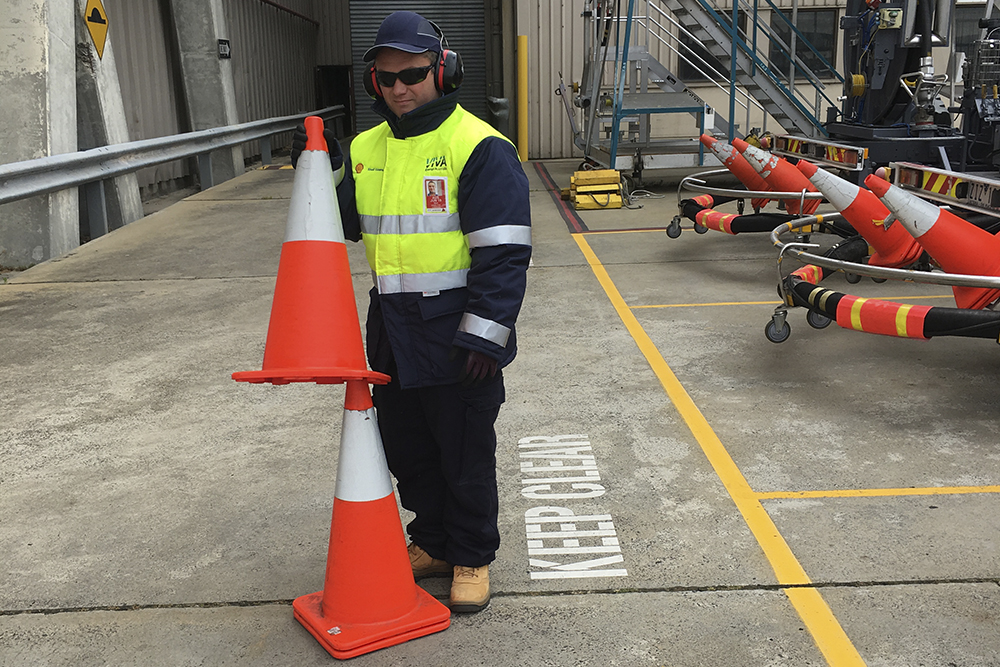Following Viva Energy’s purchase of Shell’s Aviation business in Australia in 2017, our Health team took off to Melbourne Airport to learn more about this new and exciting part of our business and to meet the refueling team who undertake a lot of manual handling activities. The team went on a journey of discovery and found a range of opportunities to improve the health and safety outcomes for the team on the ground.
The collaborative approach involved the Aviation, Health, Safety, HR, and Operations teams, and included a review of previous injury reports, and conversations with the team doing the refueling task. This highlighted certain risks within the tasks they were performing and identified some of the physical issues they had experienced.
To understand the daily physical demands of refueling aircraft at a major airport, our Health team spent hundreds of hours observing and undertaking the actual task, before completing an analysis that provided us with a measurable baseline to work with and report against.

Taking a multi-faceted approach to the problem
The results of the analysis that was undertaken by the Health team led to a range of initiatives to improve the personal safety outcomes for the team conducting the refueling task.
- Driving better recruitment:
From November 2017, we established a standardised process, conducted by Sonic Health Physiotherapists, to screen and functionally assess candidates applying for all Refueling roles to see if they can meet the physical requirements of the job.
- A safer safety cone:
We retrained Refuelers and Shift Team Leads on a new technique for lifting and moving safety cones, and we replaced all the safety cones at Melbourne Airport with consistently sized, lighter versions. This initiative has helped reduced the risk of injury related to the safety cone task.
-
Updating the manual handling procedure:
The 100-page manual handling procedures training and induction pack was streamlined with a greater focus on the types of injury trends we were seeing in our business. A training course was developed and delivered to our Shift Team Leads with the intent of driving onsite change. With ongoing support from the HR and Health teams, this increased their knowledge and confidence to review the tasks being performed by the Refueling team.
-
Prevention really is better than cure:
We trialed a two-phase early injury intervention and prevention program with phase one focused on early reactive injury intervention. This program is focused on preventing non-limiting muscular “niggles” from turning into a function limiting injury.
The second phase concentrated on proactive prevention through the implementation of the Move4Life program. This program emphasises the benefits of healthy movement and engagement of the workforce by encouraging them to take ownership of their physical health outcomes. We believe that as this program takes hold, the need for reactive management of issues will diminish.
A great success
While we are still at the early stages of seeing the full benefits from these programs, we have already seen an end to injury reports related to safety cones, a reduction in manual handling injuries, and prevention of two compensable work cover claims as a result of active treatment of the injury and practical advice including the restriction of duties whilst they recovered.
In addition, there has been an increase in positive discussions within the work group in relation to the safety cone procedure, and an observed increase in positive interventions by the Shift Team Leads with Refuelers, which has led to an improvement in team morale.
This has demonstrated the effectiveness of an approach that is focused on understanding the task, care for our employees, engagement and regular collaboration within the team and with health professionals and having data to measure the success of the programs. As a result of these successes, plans are underway to roll out the program to other airports around Australia.
Mark Hazelton has been selected as a finalist in Worksafe’s 2018 Recognition of Excellence Awards, in the “Excellence in Personal Injury Management” category. This award acknowledges the outstanding contribution made by an individual to their organisation in the field of personal injury management.
Want to know more about Goal Zero and Viva Energy’s commitment to safety? Visit our HSSE webpage for further information.